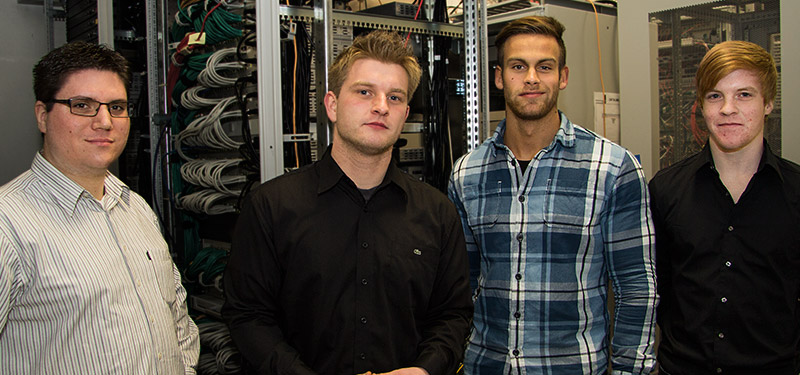Job specifications and requirements are continuously rising. Hence more and more young people decide to go to university. However, a well guided apprenticeship may offer just as many opportunities. Therefore Guntermann & Drunck and QOSIT, who are also based in the region, decided to cooperate forming an apprenticeship exchange programme.
Introducing our instructor: Mr Andreas Gerlach
Mr Andreas Gerlach, IT Administrator and 26 years of age, started working for Guntermann & Drunck in 2010.
In November 2012 he successfully passed his exams at the Chamber of Commerce in Siegen qualifying and officially entitling Mr Gerlach to become the next Guntermann & Drunck instructor responsible for our three IT apprentices and one Media & Web Design apprentice. He will be the main contact for our apprentices throughout their three year apprenticeship up until their final exams.
Mr Gerlach, please explain what exactly is implied when we talk about an apprenticeship exchange programme?

Andreas Gerlach: The exchange programme is quite a novel and interesting project offering the apprentices the opportunity to work in another company for a period of three months during their apprenticeship.
Which other company did Guntermann & Drunck select for this exchange programme?
Andreas Gerlach: We selected QOSIT, another IT company, who are based near by. G&D and QOSIT know each other well as we already cooperate closely in other business areas.
How did it all come about in the first place?
Andreas Gerlach: Our management had been considering such an exchange programme for some time. We discussed its PROs & CONs , its purpose and if it made sense after all. In the end we came to the conclusion that there were more advantages than disadvantages and the experiment worthwhile trying.
Having worked with QOSIT for many years in the IT market, we thought that they might be the ideal partner for such a project and proposed our new concept.
QOSIT proved open to our proposal and we ended up tying down the framework such as duration of the exchange visit and the company divisions the apprentices are going to work in.
The exchange visit is from March until May. Currently Mr Thilo Klein (Qosit) and Mr Daniel Berkemer (G&D) are participating.
How do you organise the exchange programme?
Andreas Gerlach: As a start off the apprentices are shown round the new company and are being introduced to their “new colleagues”.Then they will start working practically in the different divisions. Naturally G&D and QOSIT continuously exchange information to keep each other updated as to what is happening.
During those three months the apprentices will be fully under the responsibility of the other company. If, for example, Daniel Berkemer wishes to have a day off, he has to address their request to QOSIT … and not G&D. Vice versa the same goes for Thilo Klein.
How do the apprentices profit ? And, is it also advantageous to the participating companies?
Andreas Gerlach: Our apprentices are usually 19 – 20 years old. During the exchange they will have to adapt to a new environment as well as a different handling of daily operations which will force them to rethink and reconsider their decisions. The experiences already made in their mother company combined with the new impressions during the exchange will help them mature character wise and act more independently in the future. We expect that getting an insight into other company structures at a relatively early age will widen their own horizon.
Further to that we hope to strengthen their character which can only be of profit to any employer as well as taking up new challenges with a more open set of mind.
What are your experiences up to now?
Andreas Gerlach: Shortly G&D and QOSIT will discuss the experiences made during the first two months of the exchange programme. But, as far as we can judge right now all goes well and we are both more than satisfied.
Do you think this project will have a future?
Andreas Gerlach: Yes, I am quite optimistic. As said in the beginning, these days many young people opt for university after leaving school. Currently German companies offer a lot of free apprenticeship places and it is getting more difficult to find young people who are willing and committed.
Companies training apprentices over a period of three years will have qualified staff in the future. Long ago Germany institutionalized apprenticeships as a vital backbone across any industry sector be it in midsize or large international companies or within the traditional guilds. Keeping up this tradition and investing into young people now is our guarantee for having qualified staff in the future – to remain compatible and successful in a globalized world.
Consequently companies have to offer more opportunities nowadays encouraging young people to enter into a three year apprenticeship. Such an exchange programme is but one way of rising our qualification standards.
Mr Gerlach, thank you very much indeed for your time and interesting comments!

